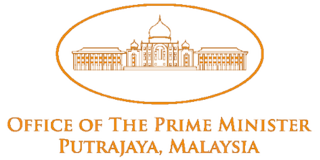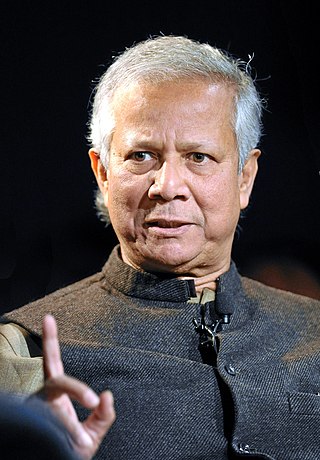Related Research Articles

A prime minister or chief of cabinet is the head of the cabinet and the leader of the ministers in the executive branch of government, often in a parliamentary or semi-presidential system. A prime minister is not the head of state, but rather the head of government, serving as the chief of the executive under either a monarch or a president in a republican form of government.

The prime minister of the United Kingdom is the head of government of the United Kingdom. The prime minister advises the sovereign on the exercise of much of the royal prerogative, chairs the Cabinet, and selects its ministers. As modern prime ministers hold office by virtue of their ability to command the confidence of the House of Commons, they sit as members of Parliament.

The prime minister of Japan is the head of government and the highest political position of Japan. The prime minister chairs the Cabinet of Japan and has the ability to select and dismiss its ministers of state. The prime minister also serves as the commander-in-chief of the Japan Self Defence Forces and is a sitting member of either house of the National Diet. The current prime minister is Fumio Kishida of the Liberal Democratic Party, who assumed the office on 4 October 2021.

The prime minister of Belgium or the premier of Belgium is the head of the federal government of Belgium, and the most powerful person in Belgian politics.

The Chancellor of the Duchy of Lancaster is a ministerial office in the Government of the United Kingdom. Excluding the prime minister, the chancellor is the highest ranking minister in the Cabinet Office, immediately after the Prime Minister, and senior to the Minister for the Cabinet Office. The role includes as part of its duties the administration of the estates and rents of the Duchy of Lancaster.
Minister of state is a designation for a government minister, with varying meanings in different jurisdictions. In a number of European countries, the title is given as an honorific conferring a higher rank, often bestowed upon senior ministers. In the United Kingdom and several other Commonwealth countries, "minister of state" is a junior rank subordinate to ministers of higher rank. In Brazil and Japan, all ministers of cabinet rank hold the title, while in Australia "minister of state" is the designation applied to all government ministers regardless of rank.

The prime minister of the Netherlands is the head of the executive branch of the Government of the Netherlands. Although the monarch is the de jure head of government, the prime minister de facto occupies this role as the officeholder chairs the Council of Ministers and coordinates its policy with the rest of the cabinet. In his role as head of government, the prime minister also represents the Netherlands in the European Council. The current prime minister, Dick Schoof, has been in the position since 2 July 2024, with his cabinet being sworn in on the same day.

The secretary of state for defence, also known as the defence secretary, is a secretary of state in the Government of the United Kingdom, with responsibility for the Ministry of Defence. As a senior minister, the incumbent is a member of the Cabinet of the United Kingdom.
A deputy prime minister or vice prime minister is, in some countries, a government minister who can take the position of acting prime minister when the prime minister is temporarily absent. The position is often likened to that of a vice president, as both positions are "number two" offices, but there are some differences.
A minister without portfolio is a government minister without specific responsibility as head of a government department. The sinecure is particularly common in countries ruled by coalition governments and a cabinet with decision-making authority wherein ministers without portfolio, while they may not head any particular offices or ministries, may still receive a ministerial salary and have the right to cast a vote in cabinet decisions. The office may also exist to give party leaders whose offices would not otherwise enable them to sit in Cabinet.
A parliamentary secretary is a Member of Parliament in the Westminster system who assists a more senior minister with their duties. In several countries, the position has been re-designated as assistant minister.

The prime ministerof Malaysia is the head of government of Malaysia. The prime minister directs the executive branch of the federal government. The Yang di-Pertuan Agong appoints the prime minister as a member of Parliament (MP) who, in his opinion, is most likely to command the confidence of a majority of MPs. The prime minister is usually the leader of the party winning the most seats in a general election.
A cabinet secretary is usually a senior official who provides services and advice to a cabinet of ministers as part of the Cabinet Office. In many countries, the position can have considerably wider functions and powers, including general responsibility for the entire civil service.
A cabinet reshuffle or shuffle occurs when a head of government rotates or changes the composition of ministers in their cabinet, or when the head of state changes the head of government and a number of ministers. They are more common in parliamentary systems than in systems where cabinet heads must be confirmed by a separate legislative body, and occur frequently in autocratic systems.

The Minister for the Cabinet Office is a position in the Cabinet Office of the United Kingdom. The minister is responsible for the work and policies of the Cabinet Office, and since February 2022, reports to the Chancellor of the Duchy of Lancaster. The position is currently the third highest ranking minister in the Cabinet Office, after the Prime Minister and the Chancellor of the Duchy of Lancaster.

The prime minister of Egypt, sometimes referred to as "Minister-President of Egypt" and "President of the Government", is the head of the Egyptian government. A direct translation of the Arabic-language title is "President of the Council of Ministers", as is the case with the Prime Minister of Syria.

The chief cabinet secretary of Japan is a member of the cabinet and is the leader and chief executive of the Cabinet Secretariat of Japan. The chief cabinet secretary coordinates the policies of ministries and agencies in the executive branch, and also serves as the government's press secretary. The secretary is a statutory member of the National Security Council, and is appointed by the emperor upon the nomination by the prime minister. The chief cabinet secretary is the second in line of succession to the prime minister, and 1st if the office of the deputy prime minister is unoccupied.
The title secretary of state or state's secretary is commonly used for senior or mid-level posts in governments around the world. The role varies between countries, and in some cases there are multiple secretaries of state in the country's system of governing the country.

The Cabinet of Bangladesh is the chief executive body in the People's Republic of Bangladesh. The cabinet is the collective decision-making body of the entire government normally under the Office of the Prime Minister, composed of the prime minister and other cabinet ministers. During a caretaker government or interim government, the cabinet is instead composed of the chief adviser and other cabinet advisers. These "advisorial" positions are equivalent to their respective ministerial positions.

A cabinet in governing is a group of people with the constitutional or legal task to rule a country or state, or advise a head of state, usually from the executive branch. Their members are known as ministers and secretaries and they are often appointed by the head of state or prime minister. Cabinets are typically the body responsible for the day-to-day management of the government and response to sudden events, whereas the legislative and judicial branches work in a measured pace, in sessions according to lengthy procedures.
References
- ↑ "MLA Biographies - Living". www.gov.mb.ca. Retrieved 2021-06-15.